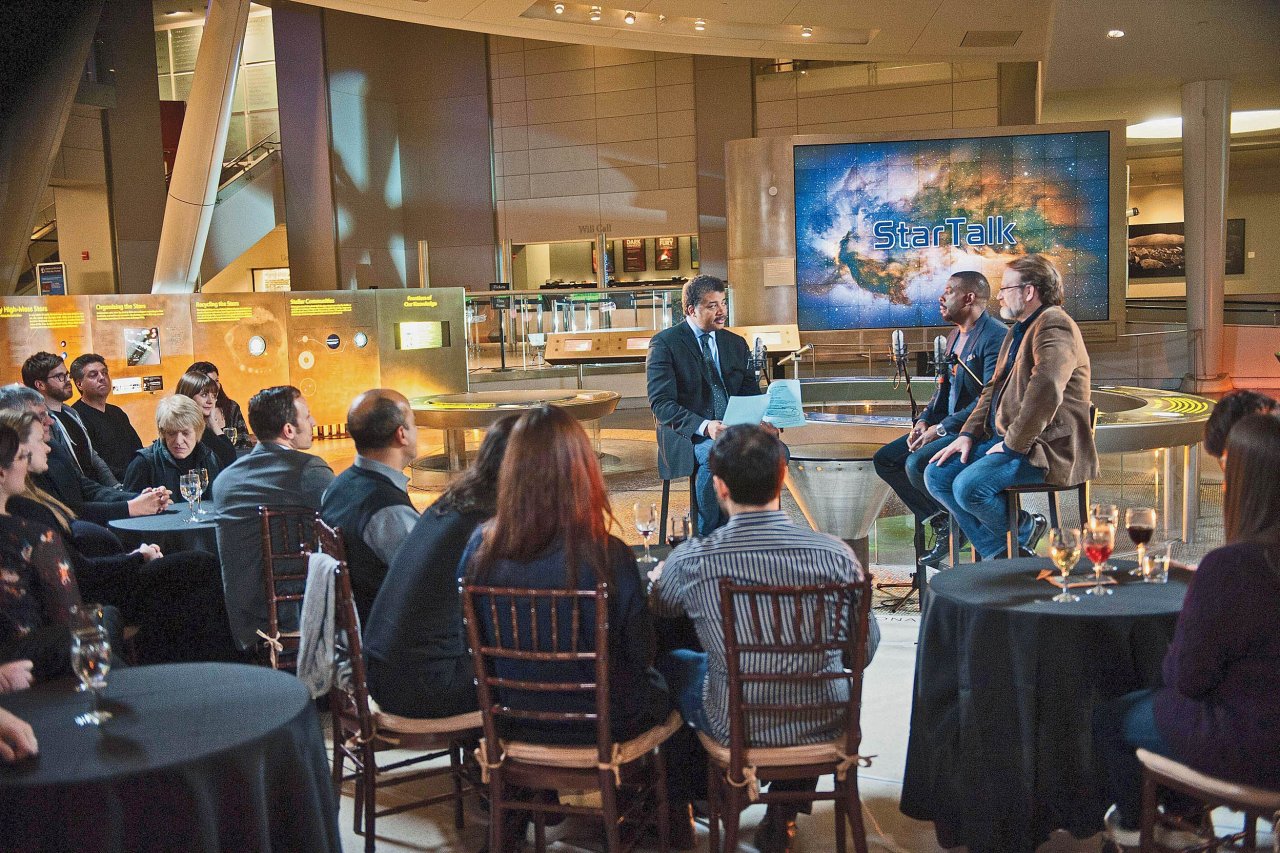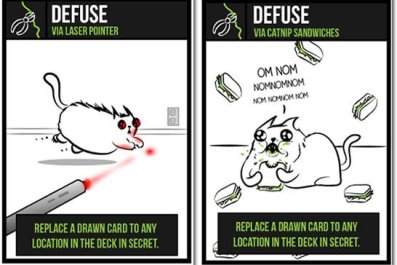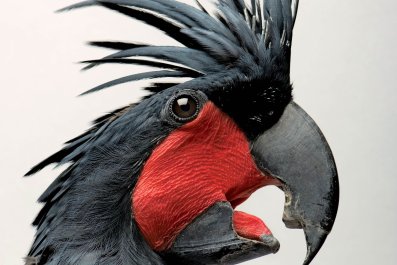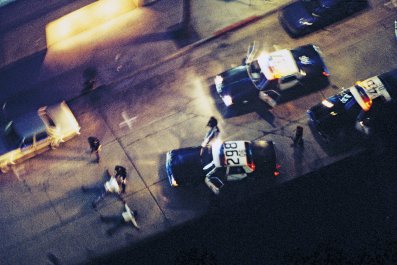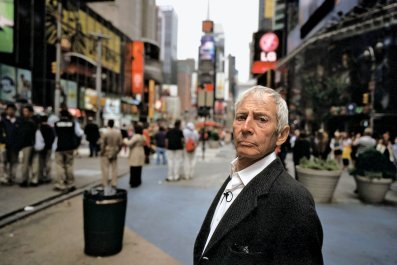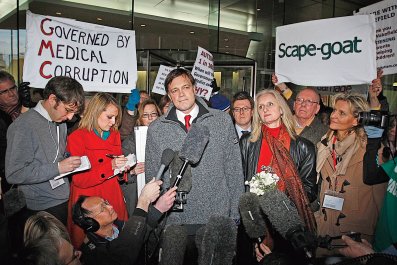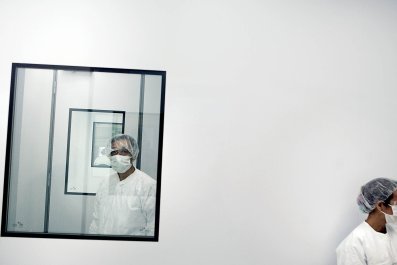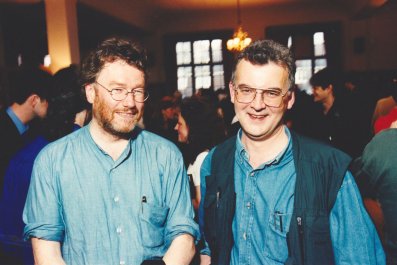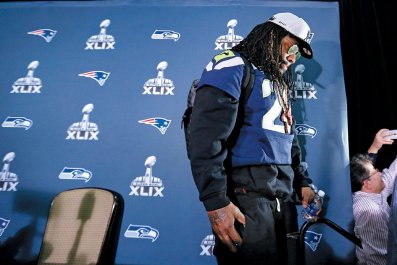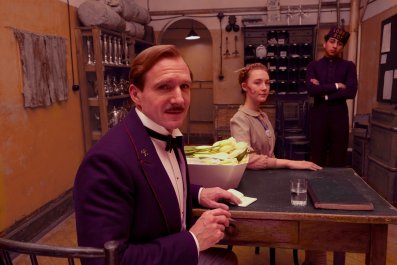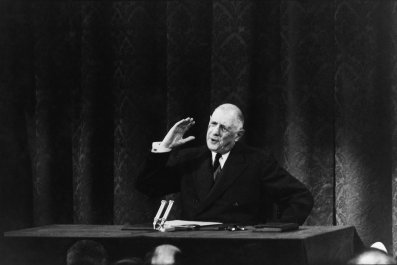"We have to take a selfie! We have to take a selfie!" says Neil deGrasse Tyson, astrophysicist, cosmologist and perhaps the only living scientist with cult-like celebrity status. On a Tuesday evening in January he is standing under the giant sphere of the Hayden Planetarium, where he serves as director, urging some friends to join him. Behind him are cameras on dollies and the simple set of StarTalk, his new late-night TV show for National Geographic's channel: Three chairs and three microphones, one each for him and two guests: a scientist and a comedian. That's it. No stage, no desk, no backdrop. Any accoutrements would look shabby next to the hulking planetarium dome and the multiple astrophysics PhDs anyhow.
Tyson beckons with both arms to award-winning New York Times science writer Dennis Overbye, who is in the audience for the taping tonight, and Janna Levin, a cosmologist and Barnard College professor, who is his "scientist" guest for this episode. She's wearing a dress covered in stars. Tyson's tie is painted with galaxies and nebulas. It's made by "a woman named Beverly who makes them in her garage in Westchester," he tells the audience, adding that he tried to order more, but she'd gone out of business.
Tyson, at 6'2'', is by far the tallest of the three, so he extends his iPhone for the selfie. They all press together for a moment, taking several shots, Tyson giggling a little. Yes, Tyson giggles. He chuckles too. Often. Several times over the course of the evening, in the midst of taping, he leans forward and lets out full-throated, gasping bouts of laughter in response to clever remarks from his guests.
There is something unsettling yet charming about watching the most famous astrophysicist in the world laugh that hard. When was the last time you saw a scientist having fun?
And that's the point.
With his hit Fox show Cosmos, he dusted off our underused senses of wonder by zooming around in a CGI spaceship and explaining the origins of the universe. With StarTalk, he wants to remind us that scientists are just regular folk, and that the work they do is not an arcane scholarly exercise, but very much our business too. He's taking science out of the "science" box and spreading it all over everything.

StarTalk will be the first U.S. TV talk show about science. The idea that science can fit within the format of a lively on-air conversation, as opposed to a lecture or demonstration, is a not-small revolution for the genre. Talk shows are about the pleasure of watching unscripted banter between larger-than-life personalities, but can one banter about black holes? Can one argue on-air about the space-time continuum without giving 10 million people headaches? At some point during the taping, Levin, the cosmologist, referred to the film Interstellar as an "orgy of relativity," and I thought, Yes, yes you can.
Tyson feels pretty sure we've been ready for science in primetime for quite a while. "Imagine 10 years ago, walking up to a studio and pitching a show where you have five scientists talking about geeky things to each other. You'd get laughed out the room. But now it's the most popular show on TV: The Big Bang Theory."
Tyson wants to make science as relevant to the TV-watching masses as the latest movements of Kim Kardashian. "Movies like Interstellar and Gravity got people talking about the universe, about space, about science–and about scientists, as people, and as people you might like to be," he says. "It's about putting science in the dialogue, science in the culture." He begins each episode of his new show by looking dead-on into the camera, twisting his face into a comically serious expression, and reciting, in his baritone, "StarTalk. Where science and pop culture collide." The episodes taped that evening include deep dives into the science behind Interstellar, and an exploration of race on the series Star Trek, complete with a guest appearance from George Takei, a regular on that show.
This seems to be a good time to stage a tastemaking assault. The full pop cultural spectrum already appears to be glutting itself on science. The Facebook page "I Fucking Love Science," which condenses the latest scientific discoveries into highly shareable bite-sized posts, has nearly 20 million "likes." Astronauts like NASA's Reid Wiseman and Germany's Alexander Gerst send updates from life in space to their hundreds of thousands of Twitter followers. Tyson has three million Twitter followers. Tumblr, meanwhile, is awash in pretty pictures of purpled nebulas and vintage anatomy diagrams. A Tumblr page called Startorialist, maintained by a pair of PhD astronomers, posts links to collections of galaxy dresses and NASA-themed jackets under the ever-expanding genre of space fashion. Dressing like a geek has gone from droll to camp to couture.
Tyson is not a purist. If a photo of a nebula or a galaxy dress makes people feel closer to science, it has value. Tyson's office in the American Museum of Natural History is full of examples of the cosmos in high kitsch. A six pack of Mars beer, a bottle of Louisiana hot sauce with a space shuttle on its label, and dozens of space-themed ties are on display next to a flat-brim hat embroidered with "Bronx" (his home borough) and Russian nesting dolls with space vehicles for faces. "Loving" science, no matter how seemingly superficial that love is, is still revolutionary. He sees it all as a sign that people–all kinds of people–are finally becoming fascinated with how our world works.
"There are chapters in recent American history–perhaps the 1960s, maybe during the early Industrial Revolution–when people embraced science and technology at high levels. But it didn't necessarily infiltrate pop culture. People just knew it was there, and that it was important. We now live in a time where I think people are coming to learn the importance of science," Tyson says. "People are recognizing that science is important, and they're recognizing that science can be fun. They're recognizing that science is all around us. It's not just something you can step around, or say, 'That's for scientists but I'm into something else.' Whether or not you're into one thing or another, the science is into you. I don't think it's just anecdotal that there's a previously unserved appetite for science, and especially for the universe. Cosmos fed into that, StarTalk is feeding into that, the Big Bang Theory is feeding into that."
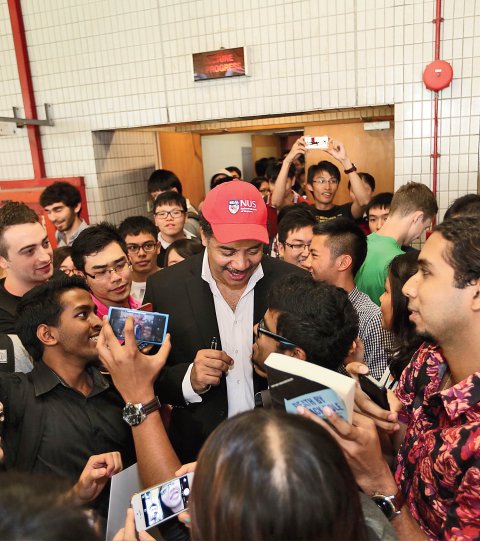
But we're not just in the studio audience for the raw scientific material. We're here for a show. Tyson's entertainment value comes in part from the fact that he can barely contain his enthusiasm. His eyebrows bounce up and down his forehead while he talks, and his face contorts into expressions that alternate between surprise, disbelief and deep interest. Once, during tonight's taping, he broke into song. Even when the cameras stop rolling between segments, Tyson chats energetically with the studio audience. When a handler comes over and starts lint-rolling Tyson's jacket, he purrs with delight. "Oh! It's like a masseuse," he says, grinning down at the lint roller, then up at the handler. "You should charge for that."
Tyson works hard at making gregarious showmanship look this easy. He studies comedians for their timing, the way they move onstage. When he gives public talks, he refuses to use anything but a hand-held mic. He likes the way he can calibrate the tone and volume of his voice by moving it farther or nearer his mouth. He takes cues from Richard Pryor, Eddie Murphy, Tim Allen, Jeff Foxworthy; Wildly different comedians who all pry observations on human nature from their daily lives. Tyson likes that way of thinking. He calls it "cosmic perspective," looking beyond oneself to some bigger truth. He also likes comedy because it gets in your head. "That's the guaranteed recipe for getting someone to not only learn the first thing you told them, but for them to come back to learn even more," he says. "I'm fundamentally an educator, and I happen to think that the universe is a hilarious place. So to the extent that I can take a pass at the information, knowledge, wisdom in a way that will make you smile, that's the path I'm going to take, because you'll remember it more."
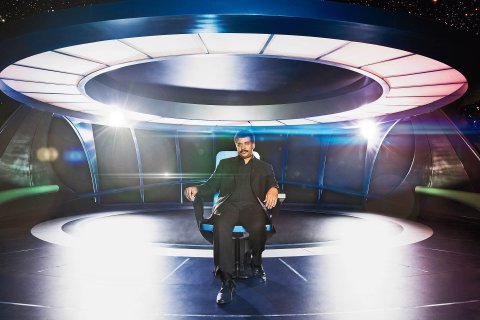
In Space, No One Can Hear You Get Flamed
On Twitter, Tyson's comedic practice is painstakingly premeditated. He tweets crumbs of science wisdom and musings about humanity to his three million followers, tailored to the news of the day, and peppered with humor. "If Gridirons were timelines, w/ BigBang at one goal, then Cavemen to now spans thickness of single turf-blade at other goal," he tweeted during the Super Bowl earlier this month. It sounds breezy, a scientific brain casually overflowing. Not quite. There's a method. He keeps it funny, to make it memorable. He confines himself to 125 characters, rather than the allowed 140, both to "hold myself to a higher standard," and also so a follower has space to manually retweet him, twitter handle and "RT" included, without changing his tweet. And he never, ever abbreviates. "It's a crutch," he says. "Look, you bought into the fact that you're limited in characters. If I have to start using letters to abbreviate words then I haven't properly formulated the idea to fit the medium."
When Tyson tweets facts about the phase of the moon or other elements in the night sky, he'll only do it in rhyme. "I don't want people to accuse me of destroying the romance of a moment by layering too much science on it."
Tyson has known he's wanted to be a scientist since he was nine, when his parents took him to the Hayden Planetarium and he saw a starry sky, albeit simulated, for the first time. But in another life, he says, he'd be writing the libretto to Broadway musicals. He likes the clever turns of phrase in Broadway songs that evoke emotion in few words. "It is this in me that operates on my tweets when I compose them. It's, What is the choice of word? And what word precedes which so that it is more mellifluous in your ear? When to alliterate and when not? Do I end on the noun or do I end on the verb? These kinds of things matter to me."
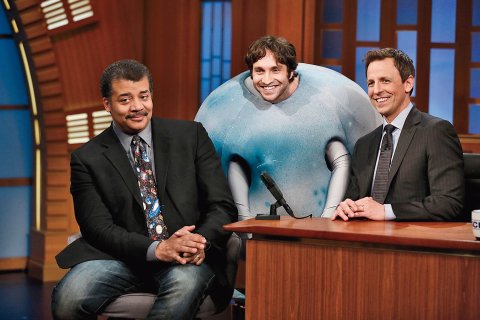
The Internet has a way of setting fires wherever there's tinder, and being a prominent scientist anywhere near a religious holiday is like being a dead tree in a drought. On Christmas, Tyson tweeted, "On this day long ago, a child was born who, by age 30, would transform the world. Happy Birthday Isaac Newton b. Dec 25, 1642." It racked up 18,000 re-tweets and all the outrage the conservative cauldrons of the Internet could muster. He was accused via blog post of "trolling Christians," and his feed was clogged with fury for days. "Will you be making the same kind of asinine comment on the next major muslim holiday, coward?" tweeted one. The backlash still baffles him. He'd tweeted about Santa and the physics of having a red-nosed reindeer minutes after, and no one got mad.
"I'm just conveying truthful information and then to see people demanding that it be taken down and it was like, whoa. Whoa! What is going on the head of a person who wants this to be taken down? Let's say you're an atheist and you want to troll Christians. What would you tweet? You would tweet things like, 'There's research that shows Jesus might not have existed.' You wouldn't be offering Isaac Newton's birthday, is what I'm thinking."
But for every person flustered by Tyson's tweet, there seems to be a legion of mega-fans. This summer, @dogboner, a Twitter account of mostly weird Internet humor maintained by Michael Hale, tweeted a photo of Tyson on the New York City subway. "Some guy using his laptop on the train like a Dumbass nerd lol," the tweet read. It quickly went viral. Hale knew who Tyson was, he wrote in a post on Gawker the next day. It was a joke. But few noticed, and instead turned out on Twitter and Facebook by the thousands to implore Hale to "fall into an ocean of A.I.D.S.," among other less printable things.
Tyson once ran into actor Charlie Sheen roaming the halls of the museum with his family. Tyson and Sheen sat down in his office for a chat. Sheen, who is mostly only in the news for drug abuse and general scene-causing these days, turns out to have a side the public has never seen.
"He was asking me, like, 'Okay but then, if the star is born, and a star is made from gas, and I see these gas clouds in hubble photos, does that mean…' and so on. Twenty minutes! A 20-minute conversation about this! And I said, nobody knows this about him. Why would they, because anybody who interviews him wants to know how crazy he is, or how many drugs he does, or how many hookers he goes with. And I thought, if I could get him back here, we could do, 'Charlie Sheen Asks an Astrophysicist.' He would get to spread his love of the geekosphere. The way I would conduct that interview is, how did you come to ask these questions? What triggers that? And so then we get inside his head about what triggers his interest."
"If you're going to print this, tell Charlie Sheen that I'm coming for him. Tell him I have people in the universe who will find him and bring him as a guest on to StarTalk."
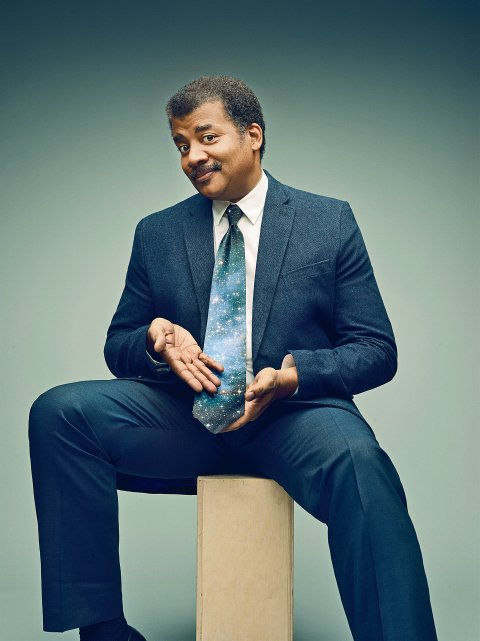
Caution: Scientist Breaking Off a Rhyme
Back on set, the cameras begin to roll again, and Tyson, Levin and comedian Eugene Mirman, who plays "Gene" on Bob's Burgers, fall deep into a conversation about wormholes, black holes and relativity. Tyson decides he wants to recite a poem he wrote 20 years ago about what would happen if one were to somehow fall into a black hole. "Actually, it's a rhyme," he says. "Poets compose poems. Regular people rhyme stuff." He asks the audience to lay down a beat. We're all grinning, sloppily snapping our fingers, trying to establish some kind of tempo. Tyson begins.
In a feet-first dive
to this cosmic abyss
You will not survive
Because you will not miss
The tidal forces of gravity
Will create quite a calamity
when you're stretched head to toe
are you sure you want to go?
Your body's atoms, you'll see them
Will enter one by one
The singularity will eat em
...and you won't be having fun.
We clap wildly. It's cheesy, but it's fun. And now we know that a "singularity" refers to the center of a black hole. The whole night is peppered with the sort of facts that inspire awe based on the sheer scale they deal in. I learn that a neutron star can have a magnetic field a trillion times stronger than the magnetic field of the earth. I learn that GPS satellites are so far from the earth that their experience of time is noticeably faster than ours, and they have to correct for the time-speed difference before beaming information into our devices. "That's general relativity manifest," Levin, the cosmologist, says.
Between segments, Tyson gives us his official prediction: "Sometime in the next decade we will know if there is life elsewhere in our solar system." The grandeur of the thought has the audience members turning to each other, eyebrows up. Aliens in 10 years? Cool.
The man sitting to my left, Devon James, is a 24-year-old environmental chemistry graduate student at Queens College. He has a copy of The Tao of Physics: An Exploration of the Parallels Between Modern Physics and Eastern Mysticism in his lap. He's been a fan of Tyson's for years. "As an inner-city kid I can relate to him. He said he didn't see stars for the first time until he was nine, because of the light pollution in NYC. That's how he became fascinated with space. I saw my first big dipper in upstate New York, when I went to college in Ithaca," James says. "Plus he's brown, and a scientist. A brown scientist. I can dig that."
Long before Cosmos, and before Tyson skyrocketed to mainstream fame, his work was in astrophysical research. He has published 10 books, and several papers, with titles like, "Radial Velocity Distribution and Line Strengths of 33 Carbon Stars in the Galactic Bulge" and"On the possibility of Gas-Rich Dwarf Galaxies in the Lyman-alpha Forest." Tyson says he plans to return to that line of work soon. He jokes that he won't be able to "claim science" as his field for much longer unless he sits down and does some hard science. "However delusional I am in even thinking this way, I have it in mind to bring my research profile back up to steam over the next year or so," he says. "I have some people who are eager to collaborate and other projects that were put on hold, so I can step right in practically on a moments notice."
For now, though, the agenda is full media saturation. During the next commercial break, Tyson is thinking beyond his show. If pop culture is finally embracing astrophysics, why can't it give some love to earth systems science? "I'd love to believe, however delusionally, that producers and gatekeepers of media will say, 'Hey, if that works for astronomy, maybe it will work for biology, or chemistry, or geology.' And then you can slip in pop culturally-relevant issues in that dialogue. You could look at fracking, or alternative energy. You could make those themes of a show. Look at the number of people who attend Comic Con. Hundreds of thousands of people. And it's all stripes of people. There are men, women, old people, young people, children. Regular people, beautiful people. All there. … We all have some measure of an inner geek within us. And when you express that inner geek, it's not about judgements, it's about celebrating life, and about celebrating our understanding of the methods and tools and understanding of nature."
But this isn't just about unleashing our inner geeks. Tyson is jarringly resolute when he shoots down a question about whether he'd like to start a kids show. He absolutely doesn't. He says humanity doesn't have time for that, with millions of science-illiterate adults walking around making decisions. "It's the scientifically illiterate adult that wields resources and opportunities, and if they don't have that literacy there's no hope for the country," he says. "I don't have the patience to train middle-schoolers to become scientifically literate and wait 40 years for them to become President."
Correction: An earlier version of this story misspelt the name of deGrasse Tyson's show "Cosmos: A Spacetime Odyssey" in a photo caption.



